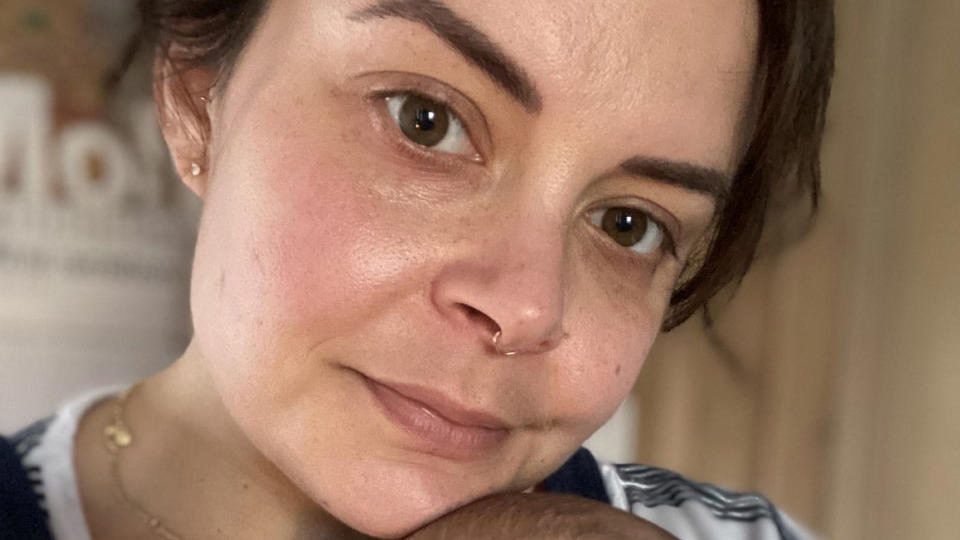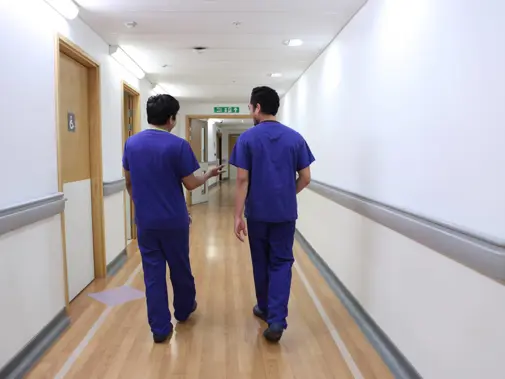Junior doctors in Scotland are being urged to vote for industrial action to send a strong message to the Scottish Government.
BMA Scottish doctors chair Chris Smith said it was vital to back the campaign for pay restoration – warning that Scottish junior doctors had seen their pay drop by 23.5 per cent in real terms since 2008.
Following a meeting with new cabinet secretary for health Michael Matheson, BMA Scotland has agreed to enter formal pay negotiations with the Scottish Government.
But Dr Smith said it was still important for doctors to make their voices heard in the ballot, which runs until 5 May.
‘While this is a step in the right direction, it is by no means a guarantee to yield the results we desperately need to secure the future of the junior doctor workforce, and our ballot on industrial action is continuing as planned. It is vital that we return the strongest possible result to take to the table in our negotiations.’
The BMA has already announced that junior doctors in England will walk out a second time in their dispute over pay restoration, with a 96-hour strike from 11 April.
 Sara O'Rourke
Sara O'Rourke
Sara O’Rourke should be enjoying her first few months with her new daughter Orla before rejoining the training programme she always hoped would lead to a career as a plastic surgeon.
Instead, worries about money mean that she is planning to finish her maternity leave early – and is rethinking her career options, in part because of the sheer financial pressures of being a junior doctor.
That’s why she will be voting to take industrial action over pay erosion, when the ballot of Scottish junior doctors opens on 29 March.
‘Pay erosion is extremely significant in itself, and it’s becoming more and more apparent with the rising costs of everything else,’ says Miss O’Rourke, a core surgical trainee currently based at NHS Lothian. ‘But the cost of being a doctor was already huge – university fees, fees for your licence, for your defence, for your examinations and courses. I’m on maternity leave now, but I’m cutting it short because we’re going to run out of money, basically.’
Hidden costs
To be able to apply for surgical training, she needs to do far more courses than are covered by the study leave budget. ‘They cost at least £800 to £2,000,’ she says.
‘There are all sorts of hidden costs that people don’t know about.’
Pay erosion is symptomatic of a wider lack of respect for doctors in training, she believes, including from politicians.
‘Colleagues are in it with you, and a lot of patients are really grateful and understanding, and that’s exactly what you work for. But it seems there is a general lack of appreciation or respect for what we are doing, and what we are constantly going through to try to be the best doctors we can be – and just to sustain our career.’
Miss O’Rourke came relatively late to medicine, having originally read history in London. She studied medicine in Manchester, racking up around £80,000 in debt. It would have been much more, she says, but her parents were able to help her with accommodation. She also accrued around £26,000 debt during her first degree.
As well as these ongoing financial pressures, the structure of junior doctor training means that if she wants to pursue a career in plastics, she would generally be expected to spend at least two years in another centre, which could be anywhere in Scotland, and would also add to living costs. Childcare costs are another pressure – even with an NHS discount, a nursery place will cost around £65 per day, and that doesn’t even cover the shifts of 12 hours-plus that she will be expected to work.
Systemic pressure
As well as money, however, it’s the culture in the health service currently that makes it a hard place to work, she says. She felt as though she caused the service a ‘headache’ during her pregnancy, for example when she had to adapt her duties, such as avoiding longer, busier shifts because she couldn’t be on her feet for long periods of time.
‘I was treated with patience and empathy by my colleagues, but I felt like I was causing a problem to the service and it was overall a really bad experience, to the point where it was a relief to leave work.’
Even without the pregnancy factor, she says junior doctors are often put under intolerable pressure to work beyond their contracted hours, and to take up locum shifts to fill rota gaps.
‘In practice, rotas are rarely compliant,’ she says. ‘There’s often a play on moral obligation to help out because you feel that even if you don’t have the personal time or energy to do extra hours, you’re going to be letting down your colleagues. I think the service can prey on the generally kind and helpful nature of staff to take on extra work or stay on late over and over rather than work to their contract.’
She is currently on half pay, and when that runs out, she will have to rely on statutory maternity pay (£155.66 per week). ‘My partner has taken on more work, but that’s not a fair burden for him. If I go back to work in August, it takes the financial pressure off us as a family.’
The impact of pay erosion has already had a real impact on her personal and working life. She lives in East Lothian but her most recent placement was at St John’s Hospital in West Lothian.
‘We have a really old car and it experienced many issues and we couldn’t afford to fix it. The trains don’t leave early enough from my station to get me to work for 8am, so I was getting an early bus to Edinburgh then another bus to work – while I was heavily pregnant. It took around two hours each way.’
Staff shortages
Junior doctors are facing pressures at work on a daily basis, and it’s taking its toll, says Miss O’Rourke. ‘Most people are acutely aware that there are lots of staff shortages, and resource shortages and mounting pressures.
The result is that the service is very stretched. Patients do come in feeling frustrated sometimes and we bear the brunt, not just doctors, but all staff. The majority of time it’s not personal, but I feel at a system level that we’re often not seen as individuals, we’re seen as numbers or robots.’
Tackling pay erosion isn’t the only change needed, but it would be a start, she says. ‘I want to see the Government make medicine a more sustainable career by honouring the fact that it’s so expensive and takes such a long time to train, so it continues to be expensive. Everything in life is expensive and the job we do can be exceptionally hard.’
 Shereif Kholeif
Shereif Kholeif
‘The problem is that the NHS is so underfunded that the work is getting harder. We’re not able to give people the care we want because colleagues are deciding – quite rightly – to take their careers elsewhere, where they are getting paid more, or have better working circumstances. There aren’t enough of us left – and that’s why working in the NHS is becoming less and less appealing.’
That’s the view of Shereif Kholeif, an FY2 doctor in the west of Scotland. He will be voting for industrial action on pay restoration when the ballot of junior doctors opens on 29 March.
According to BMA calculations, junior doctors in Scotland have suffered pay detriment since 2008, with below-inflation pay awards delivering a pay cut of 23.5 per cent for foundation year doctors and 23.9 per cent for specialty registrar junior doctors.
Dr Kholeif says that pay erosion is having a real impact – not only on individual doctors’ lives, but also on health services as a whole – and that it’s important to note that the campaign is not asking for doctors to be paid more than they were in 2008, simply that pay should keep up with inflation. Governments ignore this at their peril.
‘Pay restoration is more of a plea to try to make medicine more appealing to young people. I think that a lot of people’s motivation for doing medicine isn’t necessarily money – it’s to help people. But when you come into a profession that’s very demanding, that takes a lot of time, and suddenly pays a lot less than other graduates get, then a lot of people will opt to go elsewhere.’
Media portrayal
He has mentored high school pupils hoping to apply for medicine, he says, and has noticed changing attitudes in this important cohort. ‘I’ve already had a student drop out of the medical career path because she decided it wasn’t for her after reading everything in the news. And that’s the effect of what’s happening right now: the NHS is crumbling, and people are seeing it, so they’re choosing not to work in the profession.’
Dr Kholeif plans to enter GP training in Scotland then hopes to pursue a career specialising in sports medicine. Although he did not have to pay medical school fees as a Scottish-domiciled student, he took out student loans to meet accommodation and living costs, and also self-funded a master’s degree in sports medicine. That means he has around £30,000 to pay back, with a proportion coming out of his salary every month.
Currently he lives in Glasgow with his wife, a teacher, and is trying to tailor his training to stay local. ‘I’ll be in Glasgow for GP training but then I’ll have to go wherever there’s a job, which is difficult when you’re a young couple, and you’re planning for the future. There are a lot of factors to consider.’
He sees the pay restoration campaign as being about much more than junior doctors. ‘It’s important to make our colleagues feel valued, and make them want to stay, and to attract more people to the profession,’ he says.
‘The problem isn’t just with doctors – it extends to nurses, physios, for everyone who works in the NHS. The health service is understaffed at the moment, and when one service isn’t working, there’s a real knock-on effect on others. For example, when there isn’t enough social care, people can’t be discharged from hospital, and if there aren’t enough physios to get people up and going, then they end up with more medical issues from immobility – which then places higher demands on medical staff and nursing staff.
‘This is more of a wider NHS campaign rather than only being about pay restoration for junior doctors, and I think everyone should get behind it.’
 Dr Makdessi
Dr Makdessi
I am just the junior doctor
But I am the doctor who cannulated your mother on my knees
Singing Downtown, where all the lights are bright,
Downtown, it's gonna be alright now
As we realised the antibiotics wouldn't work
I am the doctor you cried on when we knew her light was going out
I am the doctor who knew the girl's favourite pony
And told her my favourite is Rainbowdash
So she let me touch her sore tummy
I am the doctor who told her anxious mother
There is no test that knows sickness
Like the gut feeling of a mother
I am the doctor that tried to get an NG tube into the old man's nose after he vomited blood
I held his face in my hands and said his name
As he stopped making 'respiratory effort'
And we stopped trying to keep him here with us
I am the doctor that reminded medical students they were doing well, and they could ask me anything because I knew it felt fast
I am the doctor that talked a woman down from a panic attack without drugs – because she only needed to be heard – and no-one else had listened
I am the doctor she asked for, when she was next afraid
I am the doctor that stayed after ward round
To ask the old lady and her sister if they'd understood what metastatic means or what would happen next
Who told them what we could do to slow her death and make it kind
A woman with the broken hand thought she was a broken person
I am the doctor that explained returning to abuse is far from broken, it is a normal reaction – and that she is brave and will heal
Her eyes lit up, just a bit
I am only the junior doctor.
Bella Makdessi is a foundation year 2 in the West of Scotland

